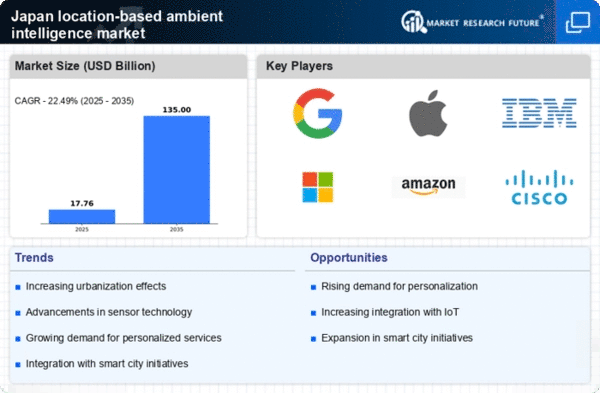Integration of Big Data Analytics
The integration of big data analytics into the location-based ambient intelligence market is transforming how businesses operate in Japan. By harnessing vast amounts of location data, companies can derive actionable insights that inform strategic decision-making. This capability is particularly valuable in sectors such as retail, transportation, and logistics, where understanding consumer behavior and optimizing routes can lead to significant cost savings. The market for big data analytics in Japan is anticipated to reach $2 billion by 2026, with a substantial portion attributed to location-based applications. As organizations increasingly recognize the value of data-driven strategies, the demand for advanced analytics tools and platforms is likely to grow, thereby enhancing the overall landscape of the location based-ambient-intelligence market.
Government Initiatives and Support
The Japanese government plays a pivotal role in fostering the location-based ambient intelligence market through various initiatives and funding programs. By promoting smart city projects and digital infrastructure, the government aims to enhance urban living standards and drive economic growth. For example, the Ministry of Internal Affairs and Communications has allocated approximately $500 million to support the development of location-based services and applications. This financial backing encourages private sector investment and innovation, leading to a more robust market environment. Furthermore, regulatory frameworks are being established to ensure data privacy and security, which are crucial for consumer trust. As these initiatives unfold, they are likely to stimulate market growth and attract new players to the location based-ambient-intelligence market.
Increased Focus on Urban Mobility Solutions
Urban mobility is a critical area of focus in Japan, influencing the location-based ambient intelligence market. With the rise of smart transportation systems, there is a pressing need for solutions that enhance the efficiency and safety of urban travel. Technologies such as real-time traffic monitoring and predictive analytics are being integrated into public transportation systems to optimize routes and reduce congestion. The Japanese government has invested heavily in smart mobility initiatives, with funding exceeding $300 million aimed at developing intelligent transportation systems. This investment not only improves the commuting experience for citizens but also supports the growth of the location based-ambient-intelligence market by creating demand for innovative mobility solutions. As urban populations continue to grow, the emphasis on efficient transportation will likely drive further advancements in this sector.
Technological Advancements in Sensor Technologies
The location-based ambient intelligence market in Japan is experiencing a surge due to rapid advancements in sensor technologies. These innovations enhance the accuracy and efficiency of data collection, enabling businesses to gather real-time information about consumer behavior and environmental conditions. For instance, the integration of high-precision GPS and RFID technologies allows for improved tracking of assets and individuals. This is particularly relevant in urban areas where dense populations necessitate precise location data. The market is projected to grow at a CAGR of 15% over the next five years, driven by the increasing demand for smart city solutions and enhanced user experiences. As a result, companies are investing heavily in developing sophisticated sensor networks that can support various applications, from retail analytics to urban planning.
Rising Demand for Personalized Consumer Experiences
In Japan, there is a growing trend towards personalized consumer experiences, which significantly impacts the location-based ambient intelligence market. Businesses are increasingly leveraging location data to tailor their offerings to individual preferences, thereby enhancing customer satisfaction and loyalty. For instance, retailers utilize geolocation services to send targeted promotions to customers' smartphones when they are in proximity to their stores. This strategy not only drives foot traffic but also increases conversion rates. Market Research Future indicates that companies employing location-based marketing strategies can see an increase in sales by up to 30%. As consumers become more accustomed to personalized interactions, the demand for sophisticated location-based solutions is expected to rise, further propelling the growth of the location based-ambient-intelligence market.
















